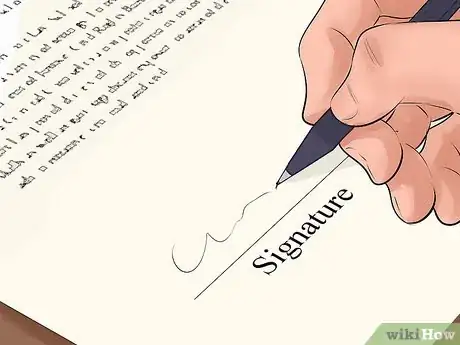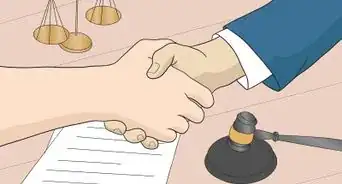This article was co-authored by Clinton M. Sandvick, JD, PhD. Clinton M. Sandvick worked as a civil litigator in California for over 7 years. He received his JD from the University of Wisconsin-Madison in 1998 and his PhD in American History from the University of Oregon in 2013.
There are 9 references cited in this article, which can be found at the bottom of the page.
This article has been viewed 64,610 times.
When you get into an automobile accident, you probably expect your insurance company to pay. After all, you have diligently paid your premiums, contacted the insurance company after the accident, and filed appropriate forms. However, you might find that the insurance company doesn’t want to cover your claim. In order to dispute an insurance claim, you will need to read your policy and then call the insurance company.
Steps
Preparing to Dispute the Claim
-
1Identify your type of dispute. You might want to dispute an insurance claim in one of two situations. First, the insurer refuses to cover a claim because it falls outside the policy. Second, the insurer will cover a claim but does not appraise the damage fairly. In either situation, you need to argue to the insurance company that their initial offer was inadequate and that you are entitled to more.
- If you are disputing a claim you made to another driver’s insurance company, then the dispute process is still the same.
- Where your insurance company has argued that your claim falls outside your policy, you should pull out your copy of the policy and read it.
-
2Understand your state law. You should try to read your state insurance law. Insurance companies must adhere to certain rules set by your state, and if your insurance company violates any of them then your case is much stronger. For example, an insurance company cannot misrepresent your policy or refuse to process claims promptly.[1]
- To find your state insurance law, visit your state’s Department of Insurance website. There should be links to your state law.
- If you can’t find anything at the state website, then perform a general Internet search, typing “insurance regulation” and your state into a web browser. Alternately, you could visit your local law library and ask someone to show you where the laws are.
Advertisement -
3Get an independent appraisal. The appraiser your insurance company uses is actually employed by the insurance company, so you shouldn’t be surprised if the damage estimate is low. The insurance company wants to pay out as little as possible. However, you can also have your own appraisal done.
- To find an appraiser that you can trust, ask friends, family, and colleagues for recommendations. You can also search for independent insurance adjusters in the phone book or online.[2]
- Hold onto the appraisal so that you can share it with the insurance company.
-
4Document communications. Always preserve any written communication related to the claim: letters, emails, and reports. Write down summaries of conversations that you have with insurance company employees, including the name of the employee and the date and time of the conversation.
- Also pay attention to timelines. Your insurance company might be trying to stall by not responding to your communications or by promising to send paperwork but never following through.[3] Follow up with the insurance company if you do not receive paperwork.
Disputing the Claim
-
1Contact the insurance company. You can begin the dispute process by calling the insurance company and talking to the claims adjuster. Express that you are unhappy with the amount being offered. Be sure to give your reasons why, mentioning your reading of the insurance policy, your independent appraisal, etc.[4]
- Stay polite. You will get farther if you always express disagreement in a calm, rational manner. You can begin by acting this way with the claims adjuster, who you will probably have the most contact with.
-
2Speak to a supervisor. If the initial claims adjuster cannot help you, then ask to speak to a supervisor. Make the same argument to this person and volunteer to send them any documents you have that support your position.[5]
- If the insurance company wants copies of documentation, send copies promptly. Never send originals as they may be lost.
-
3Follow up with a letter. Even when you initiate contact by phone, it is a good idea to send a follow-up letter. The letter serves as proof of your dispute. In the letter, reiterate your reasons why you are unhappy with the insurance company’s offer.
- Also mention the phone conversations you have had, including the names of the people you spoke with and when you spoke. Be sure to include your phone number and list the policy number somewhere in the letter.[6]
- Include copies of any written documentation, and send the letter certified mail, return receipt requested. Hold onto the receipt as it is proof that the letter was received.
-
4Complain to your state’s insurance department. When the insurance company will not provide the relief you seek, you need to go over their head. The next step is to contact your state’s insurance agency, often called the Department of Insurance. This department regulates private insurers. You can file a complaint with the department, which will then investigate.[7]
Suing the Insurance Company
-
1Talk to a lawyer. A lawyer is always helpful when you have disputes with an insurance company, especially where the lawyer has experience handling automobile insurance claims.[12] You can find a competent attorney by asking friends and family for recommendations or by visiting your state’s bar association website, which runs a referral service.
- Schedule a consultation with the lawyer. At your consultation, you can ask the lawyer whether he or she thinks that you have a strong case. You can also ask what the lawyer thinks would make your case stronger.
- Be sure to ask about fees. Your claim against the insurance company might be so low that it would not make sense to hire a lawyer. The lawyer’s hourly fee could be larger than the amount in dispute. Also, attorneys who work on contingency will not take a case if the dollar amount of the case is too low. Therefore, you should be prepared to sue an insurer without the assistance of an attorney if you cannot ultimately afford one.
- Nevertheless, it might make sense to meet for a consultation simply to get an expert’s opinion on the strength of your case.
-
2Consider alternate dispute resolution. Your insurance company may request mediation. In mediation, both you and the insurer will meet with a neutral third party (the mediator). Instead of deciding the case like a judge, the mediator will help the parties reach a mutually-agreeable solution.[13]
- The insurance company may also recommend arbitration. In arbitration, you and the insurance company will press your case in front of an arbitrator, who acts like a judge. You should think carefully before agreeing to arbitration. Companies like arbitration because it is private and generally cheaper.[14] However, you might be giving up important rights, such as the right to an appeal.
-
3Sue in court. You also have the option of going directly to court to file a “bad faith” claim against an insurance company. With a “bad faith” claim, you argue that the insurance company violated its duty to act in good faith by refusing to pay a claim, refusing to deny the claim in a reasonable amount of time, or failing to investigate the claim properly.[15]
- Depending on the dollar amount in dispute, you might be able to file in small claims court.[16] Small claims courts have streamlined procedures that allow people to sue without the assistance of an attorney. If you are seeking an amount over the limit for a small claims court, then you would file suit in regular civil court.
- For more information, see Sue an Insurance Company After an Auto Accident.
References
- ↑ http://www.360financialliteracy.org/Topics/Insurance/General-Insurance-Topics/Handling-a-Dispute-with-Your-Insurance-Company
- ↑ http://www.carinsurancecomparison.com/how-do-i-dispute-a-car-insurance-claim-adjusters-report/
- ↑ http://www.360financialliteracy.org/Topics/Insurance/General-Insurance-Topics/Handling-a-Dispute-with-Your-Insurance-Company
- ↑ http://www.dmv.org/insurance/how-to-handle-a-disputed-car-insurance-claim.php
- ↑ http://www.dmv.org/insurance/how-to-handle-a-disputed-car-insurance-claim.php
- ↑ http://www.360financialliteracy.org/Topics/Insurance/General-Insurance-Topics/Handling-a-Dispute-with-Your-Insurance-Company
- ↑ http://www.carinsurancecomparison.com/how-do-i-dispute-a-car-insurance-claim-adjusters-report/
- ↑ https://mc.insurance.illinois.gov/messagecenter.nsf
- ↑ https://apps.fldfs.com/eService/Default.aspx
- ↑ http://www.insurance.ca.gov/01-consumers/101-help/index.cfm
- ↑ http://www.dfs.ny.gov/consumer/fileacomplaint.htm
- ↑ http://www.dmv.org/insurance/how-to-handle-a-disputed-car-insurance-claim.php
- ↑ http://www.dmv.org/insurance/how-to-handle-a-disputed-car-insurance-claim.php
- ↑ https://www.freeadvice.com/insurance/how-arbitration-is-used-to-resolve-car-insurance-policy-disputes/
- ↑ http://www.nolo.com/legal-encyclopedia/car-accident-claims-bad-faith-failure-settle.html
- ↑ http://www.dmv.org/insurance/how-to-handle-a-disputed-car-insurance-claim.php
- ↑ http://www.dmv.org/insurance/how-to-handle-a-disputed-car-insurance-claim.php
About This Article
After a car accident, you might find that your or the other person's insurance company doesn't want to cover all or part of your claim. If you need to dispute an insurance claim, start by calling the insurance company and talking to a claims adjuster. Explain that you’re not happy with the amount being offered. Mention that you’re seeking an independent appraisal and are reading up on state laws that your company may be in violation of. If the claims adjuster can’t help you, ask to speak to a supervisor and make the same argument to them. Follow this conversation up with a letter and any documentation that you may have gathered. In the event that your insurance company is still unresponsive, go over their head and call the Department of Insurance, which regulates private insurers. To learn how to sue your insurance company, keep reading!































































